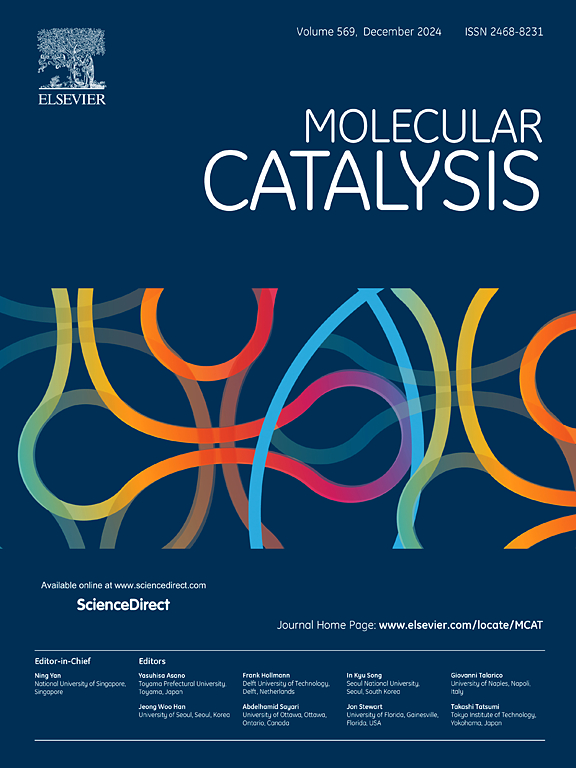大豆地杆菌脂肪酶在ZIF-8中的包埋及与genipin交联用于植物油生产生物柴油
IF 4.9
2区 化学
Q2 CHEMISTRY, PHYSICAL
引用次数: 0
摘要
脂肪酶通过绿色合成方法广泛应用于生物柴油的生产。然而,提高这些酶的性能对于高效合成生物柴油至关重要。在这项研究中,重组脂肪酶(Gklip)来源于一种嗜热细菌被固定在金属-有机框架(Gklip@ZIF-8)。此外,为了提高稳定性,与genipin进行交联(Gklip@ZIF-8-genipin)。通过SEM, SEM- eds, FTIR和TGA/DTG等仪器分析验证了固定过程。生化分析结果表明,Gklip和Gklip@ZIF-8的最适pH为8.0,Gklip@ZIF-8-genipin的最适pH为7.5。游离酶的最佳温度为50℃,两种固定化样品的最佳温度均为60℃。热稳定性测试表明,与游离酶相比,Gklip@ZIF-8和Gklip@ZIF-8-genipin在50°C时的稳定性分别提高了2.74倍和5.86倍。此外,用椰子油、冷榨向日葵油和亚麻籽油对酶样品的生物柴油生产效率进行了评估。游离酶能有效地将富含短链脂肪酸的椰子油转化为生物柴油,但不能将向日葵和亚麻籽等富含长链脂肪酸的油转化为生物柴油。相比之下,Gklip@ZIF-8和Gklip@ZIF-8-genipin有效地从这三种油中生产生物柴油。所得结果表明,Gklip@ZIF-8和Gklip@ZIF-8-genipin可以有效地应用于生物柴油的生产。本文章由计算机程序翻译,如有差异,请以英文原文为准。

Entrapment of Geobacillus kaustophilus lipase in ZIF-8 and cross-linking with genipin for biodiesel production from vegetable oils
Lipases are widely employed in biodiesel production through green synthesis approaches. However, enhancing the performance of these enzymes is crucial for efficient biodiesel synthesis. In this study, a recombinant lipase (Gklip) derived from a thermophilic bacterium was immobilized in a metal-organic framework (Gklip@ZIF-8). Additionally, to improve stability, cross-linking with genipin was performed (Gklip@ZIF-8-genipin). The immobilization process was validated through instrumental analyses including SEM, SEM-EDS, FTIR and TGA/DTG. Biochemical analyses determined that the optimum pH for Gklip and Gklip@ZIF-8 was 8.0, while Gklip@ZIF-8-genipin form had an optimum pH of 7.5. The optimum temperatures were 50 °C for the free enzyme and 60 °C for the both immobilized samples. Thermal stability tests showed that Gklip@ZIF-8 and Gklip@ZIF-8-genipin exhibited 2.74- and 5.86-fold higher stability at 50 °C compared to the free enzyme, respectively. Furthermore, the biodiesel production efficiency of the enzyme samples was evaluated using coconut, cold-pressed sunflower, and flaxseed oils. The free enzyme effectively produced biodiesel from coconut oil, which is rich in short-chain fatty acids, but failed to convert long-chain fatty acid-rich oils like sunflower and flaxseed into biodiesel. In contrast, Gklip@ZIF-8 and Gklip@ZIF-8-genipin efficiently produced biodiesel from all three oil types. The obtained results demonstrate that Gklip@ZIF-8 and Gklip@ZIF-8-genipin can be effectively applied in biodiesel production.
求助全文
通过发布文献求助,成功后即可免费获取论文全文。
去求助
来源期刊

Molecular Catalysis
Chemical Engineering-Process Chemistry and Technology
CiteScore
6.90
自引率
10.90%
发文量
700
审稿时长
40 days
期刊介绍:
Molecular Catalysis publishes full papers that are original, rigorous, and scholarly contributions examining the molecular and atomic aspects of catalytic activation and reaction mechanisms. The fields covered are:
Heterogeneous catalysis including immobilized molecular catalysts
Homogeneous catalysis including organocatalysis, organometallic catalysis and biocatalysis
Photo- and electrochemistry
Theoretical aspects of catalysis analyzed by computational methods
 求助内容:
求助内容: 应助结果提醒方式:
应助结果提醒方式:


